"Evils can be created much quicker than they can be cured." - Winston Churchill
The Walking Dead. Fear the Walking Dead. iZombie. Z-nation. The Santa Clarita Diet.
We are obsessed with zombies.
Tales of the dead coming back to life have been found in folklore and myth for thousands of years.
However, the zombie took on a new identity in the 20th century.
Some of this had to do with the introduction of cinema as a form of communication, and part of it was due to the effect of world events on key authors.
Mary Shelley’s Frankenstein and the macabre work of Edgar Allan Poe were more than just idle fiction.
They were serious commentaries on the social ills of their times.
They were the first steps toward the modern zombie stories, and reflected the plight of modern man facing an overwhelming tide of change.
This was the time of the “Industrial Revolution,” when mankind rode a meteoric path of progress on the crest of scientific discoveries.
Machines were making the jobs of the working man easier, progress and prosperity was being shared by all, and everyone shared a rosey outlook of the future.
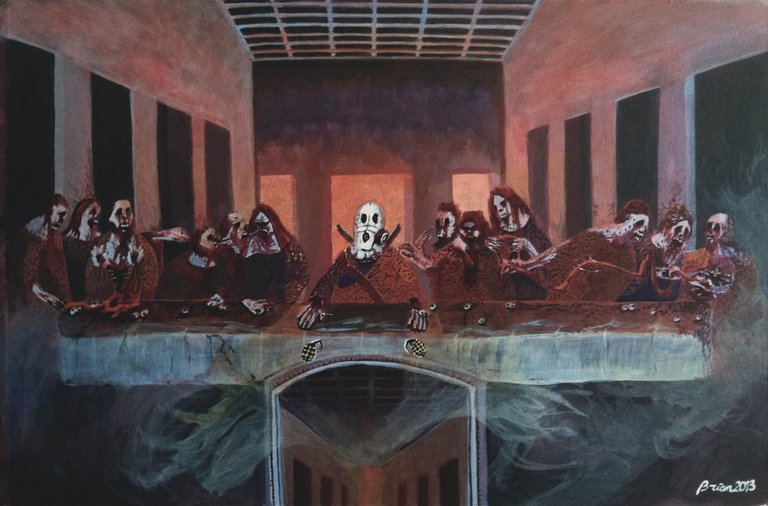
Oh wait, no, I’m sorry I got that wrong.
Progress and prosperity was definitely enjoyed by some, but what was happening was the restructuring of Western civilization.
Jobs were becoming something done while standing long hours before a machine.
Population density was undergoing a massive shift toward urban areas, to feed the growth of industry.
Quality of life increased for some, but was abysmal for most, while civilization struggled to come to terms with concepts of hygiene, sanitation, working conditions, and what defined an acceptable standard of living.
The same technological advances in industry were creating new weapons of war capable of mass destruction.
When the 20th century arrived, and H.P. Lovecraft continued the horror and zombie genre silently, to only posthumous accolades, the world was still reeling from the effects of World War 1, and the political stage had already been set for World War 2.
Mankind was becoming its own worst enemy.
The entire world had seen death, often on their own streets.
Loss of life, when combining deaths of civilians and soldiers, factored around 41 million.
200 years of “industrial progress” had brought mankind to this.
20 years later the world would again be embroiled in war, this time with the death count at 50-80 million, when counting war-related causes.
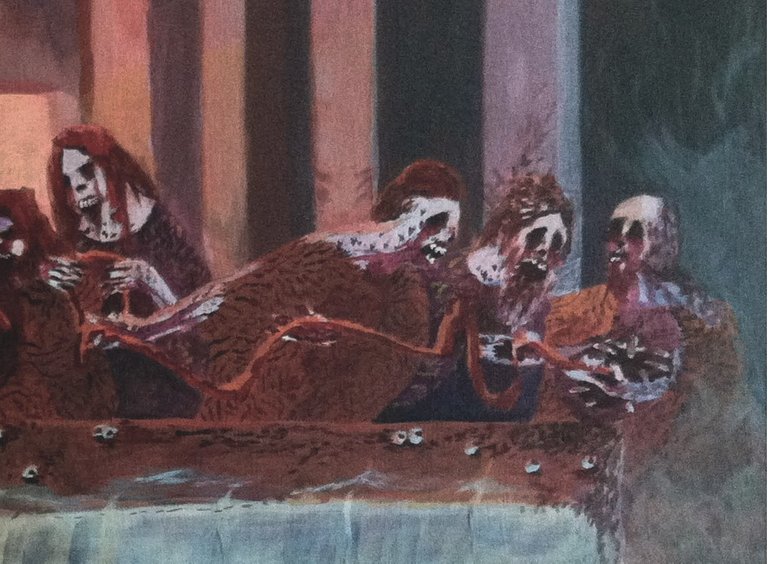
Fast forward to 1968, when George A. Romero created Night of the Living Dead, a gore flick that shocked critics but became a cult classic.
America was in the thick of the Vietnam War.
Scenes of death and destruction were being fed into the family living room via technological advances in television.
Film historian Robin Wood sees Night of the Living Dead as a critique of American Capitalism and the fight to suppress movements for human rights and equality.
He says,
"Cannibalism represents the ultimate in possessiveness, hence the logical end of human relations under capitalism." ( An Introduction to the American Horror Film. In Nichols, Bill. Movies and Methods. II. University of California Press. p. 213)
Romero’s last interview before his death in July of last year was with "Rue Morgue" horror fiction magazine concerning the upcoming release of his last film, Road of the Dead.
He said:
"It's set in a sanctuary city where this fat cat runs a haven for rich folks, and one of the things that he does is stage drag races to entertain them… there's a scientist there doing genetic experiments, trying to make the zombies stop eating us, and he has discovered that with a little tampering, they can recall certain memory skills that enable them to drive in these races. It's really The Fast and the Furious with zombies"
While making the struggle against capitalist overlords more overt, this film still in production reflects a new trend in zombies: sympathy for the zombie, due to a reflection of our own humanity in the “monster.”
This is seen in the movies Warm Bodies, (2013) Maggie, (2015) and even in a Disney movie from this year, Zombies, a musical where a zombie football player and a human cheerleader fall in love and learn to co-exist.
How does this progression of the zombie from the 20th century through the 21st track larger trends?
The 20th century saw the rise of fascism, capitalism, and colonialism as political trends that led societies into two world wars.
In psychological/philosophical terms, societies around the world were struggling to define the “self” and this necessitated the creation of the “other.”
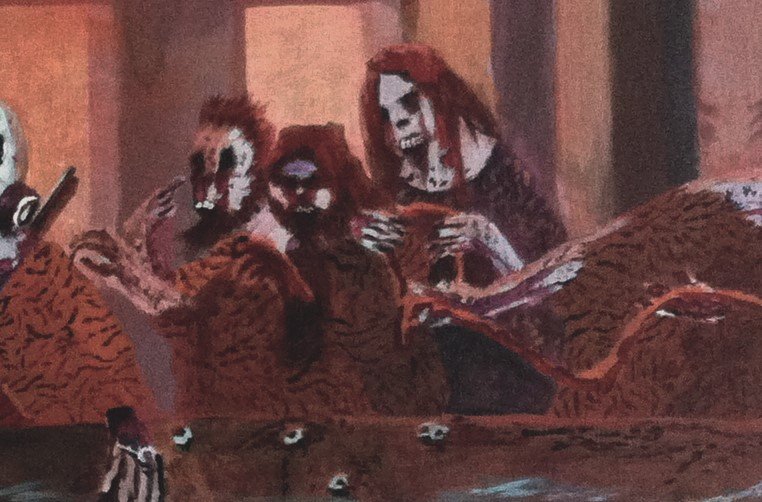
The philosopher Hegel describes this development.
Discussing the pre-self-conscious being coming to terms with the “other” he says, "Each consciousness pursues the death of the other,” meaning that the first movement of self-awareness when coming to terms with the existence of “the other” is alienation.
This was where the world was at during the 20th century, and governments, through propaganda and blind nationalism, rode that sentiment to drive mankind into widespread conflict.
How does the 20th century zombie reflect this?
Simply put, the zombie is “the other.”
When Americans went to war in trenches against Germany, it was easier to hate a “Nazi” than it was to hate another man who himself had a wife and children at home.
This is why I find the Call of Duty “Nazi zombies” doubly ironic.
As the world struggled to find its “self” in the face of global warfare, the “other” was the "enemy" or more symbolically: death.
The zombie is the perfect symbol of death incarnate, of our own mortality grinning back at us and reminding us that we all have an inescapable meeting with the grave in our futures.
The human psyche creates monsters that define our own worst fears.
Hegel went on to write his “master and slave” treatise, where he describes the further evolution of self-awareness when in the presence of “the other.”
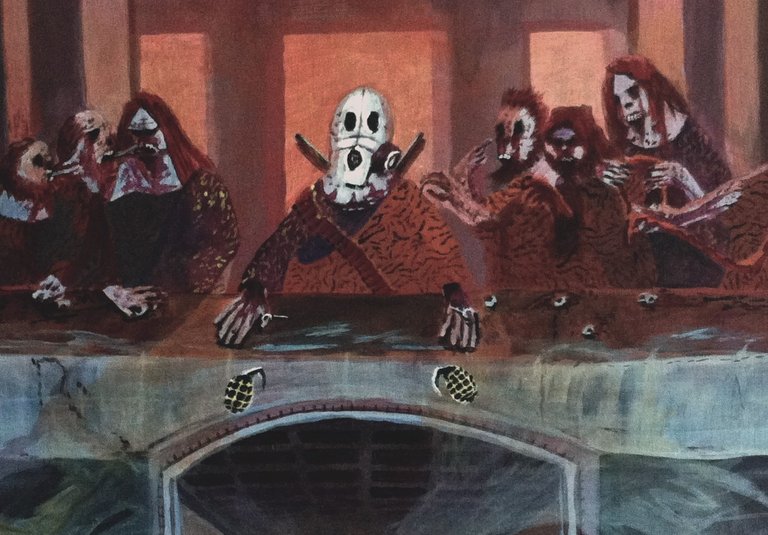
In his parable, two sentient beings when in each other’s presence will naturally settle into a master/slave power struggle.
The master will value freedom more highly and seek to impose his will.
The slave will value life, through a fear of death.
But eventually, the master will settle into a manner of life where he is entirely dependent upon the slave to provide his means of existence, while the slave, after learning more about the world and the terms of his own existence, will become more strong and realize that he is both capable and self-sufficient.
This will lead to a second confrontation where the two will have to re-assess the terms of their existence and find a way to co-exist as mutually co-dependent individuals.
This is where societies are struggling to arrive at in the 21st century, and this is where the current “sympathy for the zombie” derives from, as a reflection of larger sociopolitical trends.
Now on to my painting.
It is titled “Savior Self.” (Save yourself)
For those who do not recognize the background and posturing of the characters in the painting, it is a re-creation of daVinci’s “Last Supper.”
That painting resides in a Dominican convent in Milan, Italy.
Very little remains of the original due to poor preservation and material miscalculations by daVinci so most of the images today are drawn from replicas of it done over time.
The convent itself was struck by Allied bombing during World War 2, further contributing to damage from eroding plaster and defacement by anti-clerical French soldiers in 1796.
The soldier's scratched out the eyes of the apostles, and in my painting the "zombie apostles" have torn out their own eyes, desperate to stay blind to their own existence.
Religion is a key element of the human psyche, an important theme in art, and perhaps the primary tool throughout history that mankind has used in its definition of “self.”
There is another side to the zombie myth, and that is the “zombie slayer.”
Wherever there are ravenous undead seeking to prey upon the helpless living, there will be the zombie slayer, shotgun and machete wielding, fearless, and self-sacrificing.
He is a savior. Simply put: a messiah symbol.
Christianity presents Jesus Christ, a son of god who deigned to put on the flesh of humanity, and “die for our sins,” as a savior.
The zombie myth gives us as a savior: ourselves.
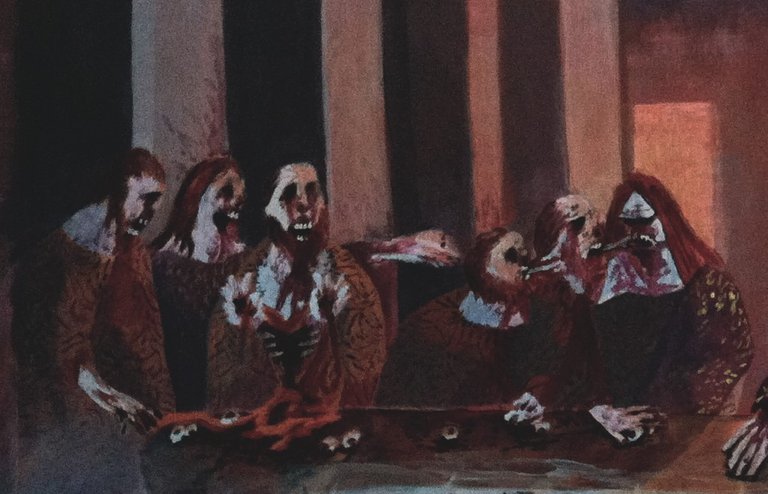
If the zombies are swarming and you choose to drop to your knees and pray: good luck.
Going deeper into the story of the “Last Supper,” it depicts a last meal shared by Christ, with his closest friends and followers.
Before that meal is over, one of them will sell him to the Romans.
Before the weekend is over, every one of them aside from Peter will have fled and hid and Peter will have denied knowing him 3 times, to the Romans.
The savior will die on the cross, crying out “my god, why have you forsaken me?”
Darkness falls over the world, as mankind lets its god die alone.
It is a powerful story, and its grip on the psyche is undeniable, as a god is forced to come to terms with the fickleness of mankind, and then face death.
In my painting, the betrayal is set in a more fundamental light of living vs undead.
Some of the most debated words from that supper are Jesus saying “Eat of my flesh, drink of my blood.”
They are words which depict one ready to make the ultimate sacrifice, and create a covenant, an eternal memorial.
But this is a painting about zombies.
This is a painting where the self-aware savior is facing the “other” and the “other” is ready to devour him whole: tear him limb from limb.
In my painting, I have chosen to “tear the temple curtain” and reveal the psyche behind the myth.
Shall this savior submit to this gruesome death, or drop his grenades and run for the door?
Are we made in the image of this messiah or is this messiah a symbol of ourselves?
Whose face is underneath the gas mask at the head of the table?
Is it Christ, or is it you?
Is it god who has created us?
Or is it we who have created god?
"The practice [of prayer] was comforting and the reasoning led nowhere. I therefore acted in accordance with my feelings without troubling to square such conduct with the conclusions of thought." - Winston Churchill
"If you tried your best to live an honorable life and did your duty and were faithful to friends and not unkind to the weak and poor, it did not matter much what you believed or disbelieved." - Winston Churchill

image source: http://www.grandspeintres.com/vinci/tableau.php?tableau=derniersouper&id_peintre=10
Do you have pencil, paper, and a thought in your head? Then you can cartoon!
Be sure to enter my weekly cartooning contest #cartoon-off. Otherwise, try to stop by and support the talented contributing cartoonists! We have a great blend of first time cartoonists and veterans!
9SBD in prizes, 3 categories.
https://steemit.com/cartoon-off/@corpsvalues/third-weekly-cartoon-off-contest-guest-judge-veryspider
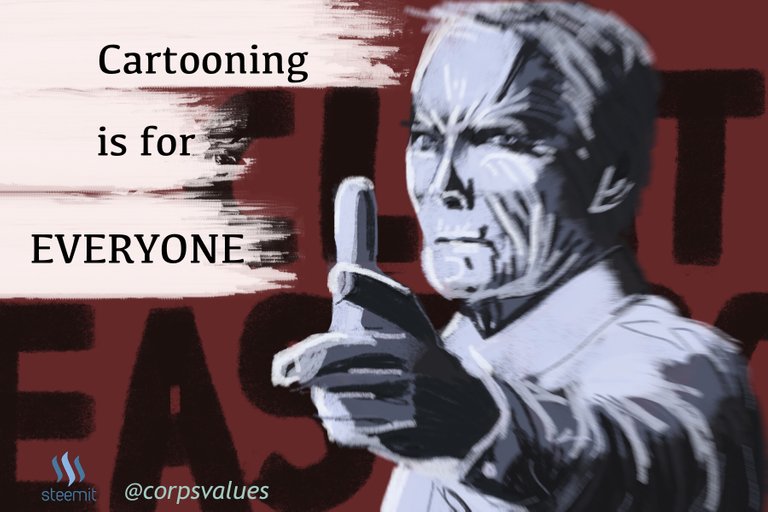
What an awesome dissertation on the correlation between zombie movies and political-economic systems.
If we seek to find what people's fixations are in regard to zombie apocalypses (or any apocalypses) we can see that most people secretly wish for an apocalyptic scenario to break them free from the forced obligations of this system's economic slavery.
The zombie element added into the doomsday scenario gives justifiable permission to brutally kill at will without guilt or ramification as a means of survival.
Thanks for a thought-provoking piece! Great artwork too!
Blissful blessings and smilesin joyNKA very good point you are making! I could probably write a whole book on the topic so it was actually hard keeping the article focused and avoiding jumping into too many areas.
Definitely agree with you there. I think it gives a lot of alpha males the opportunity to step into a fantasy where a murderous rage is all that is needed to "fix" society and be the hero.
Thank you so much for taking the time to read my article!
Thanks mate.
If I was to further the point, people are attracted to the zombie apocalypse for permission to be violent because our collect society has centuries of built up frustration and they want to vent and express their rage guilt free.
If we lived in a more equitable system fixations on such negativity would dissolve.
Blessings bro
Again in complete agreement with you. You might be interested in reading this week's article where the mythology discussion is focused on the story of Medusa and how that story was symbolic of an empire's conquest and the loss of identity for the victims.
https://steemit.com/sankofa/@corpsvalues/medusa-the-subversion-of-the-triple-moon-goddess-and-me-too
Hi corpsvalues,
Visit curiesteem.com or join the Curie Discord community to learn more.
An incredible honor. Thank you so much for your support!
Hi Corpsvalues,
This post was nominated by a @curie curator to be featured in an upcoming Author Showcase that will be posted Late Monday/Early Tuesday (U.S. time) on the @curie blog.
NOTE: If you would NOT want us to feature your post in the Author Showcase please reply, email, or DM me on Discord as soon as possible. Any photos or quoted text from your post that we feature will be properly attributed to you as the author.
You can check out our previous Author Showcase to get an idea of what we are doing with these posts.
Thanks for your time and for creating great content.
Akpan (@curie curator)
[email protected]
P.S. This is coming a bit delayed due to the issues with Steem API that is making the frontends misbehave. Bear with me. I understand the short notice may inhibit your contribution is composing the showcase post. That I will do my best to work around, and delay the release of the post for a few hours to give you time to respond.
You guys do a great job: thank you for the honor! I look forward to seeing my work in the article - exciting!
Wow, that was a heavy piece! You managed to cover a ton of ground, with a drawing to accompany. And you managed to turn a discussion about zombies in an intellectual direction. Very impressed, bravo my friend!
I have actually heard the theory that the horror in pop culture at various times reflects the subconscious fears of the populace, and I really love the idea and I buy into it. Your interpretation of zombies being linked to various fears throughout history is intriguing and fascinating. I think I would argue though, that especially recently (the walking dead era), zombies aren’t reflecting a fear of the generic “other” but instead our fears of our neighbors and fellow citizens. In an age of partisanship and division, your next door neighbor is scarier than any turbaned terrorist in a faraway land. But that actually ties in nicely with your own thoughts about humanizing the zombies and living in harmony, so I guess my starting point is not that far from your destination after all.
Other horror/thriller trends I’ve observed along with the fears I would argue they reflect: the spate of natural disaster movies (2012, the day after tomorrow) in the 90s/early 2000s (fear of climate change), the wave of dystopia films (Hunger Games, Maze Runner, Divergent) reflecting a fear of government. Superhero movies, reflecting a feeling that humans and society are beyond saving without the help of an outside force.
Great thought provoking piece! Followed and looking forward to more!
Oh great comment, and thanks for reading through the article, I know that most people haven't got through the entire thing haha.
As far as Hegel's "the other" goes, "the other" would absolutely also apply to neighbors. So pretty much every relationship in our lives, we are going through that "master/slave" cycle in his theory.
But just like individuals go through this process and then eventually mature and evolve in their self-identity and social presence, so do societies of people and nations.
But social/political evolution of self happens a lot more slowly and violently.
I love your observation of other movie trends and how they relate to world events!
You should write a blog post about one of those topics!
(kinda makes me want to do a disaster painting now lol)
That’s a great idea for a post! And I am always looking for those 😉
I’ll have to do a little more reading about Hegel and his theories. Sounds like an interesting guy!
The Day After Tomorrow is pretty spoofable. South Park had a funny parody with a hilarious scene when Randy is drawing the “everyone above this line is dead” lines on the map.
Dude,
I see you got curied. Little wonder why. This is the best thing I've read all day, maybe all week. Awesome artwork, awesome read.
Thank you so much! That means a lot coming from someone who to me writes the best consistent content in my feed.
< blush >
Very thoughtful, @corpsvalues ! With a great analysis of our fascination of death and our roles in our own fates with regards to modern love affair with capitalism and individualism.
The picture itself is a very interesting spin on the last supper and of how christianity as a concept also have their own conversation with the notion of death and resurrection.
good post ! congratulations for curie, and good luck with the contest !!!
Thanks for reading through it spider!
Yes, good point to add that Christianity has its own views on resurrection and that they believe Christ had to die so that he could one day come back and raise the bodies of his followers (if you get into Revelations).
Also something about him dying so that he could defeat death....
I really have to tread carefully because I'm not trying to offend Christians, just create a visual analogy to provoke thought =)
Wow. Just simply blown away. First, the painting is astounding. I believe I get it. Then there's the amazingly powerful words you put behind it! I wish I were better with words so I could describe it better. Man, it's beautiful.
This post has been voted on from MSP3K courtesy of @isaria from the Minnow Support Project ( @minnowsupport ).
Bots Information:
Join the P.A.L. Discord | Check out MSPSteem | Listen to MSP-Waves
The painting is fascinating, as is your treatise on zombies and their relation to the human psyche! Bravo for this fabulous introspective into the human condition!
Thank you very much!! And thanks for the opportunity to share it in pypt!
You make a very valid point about our world today.